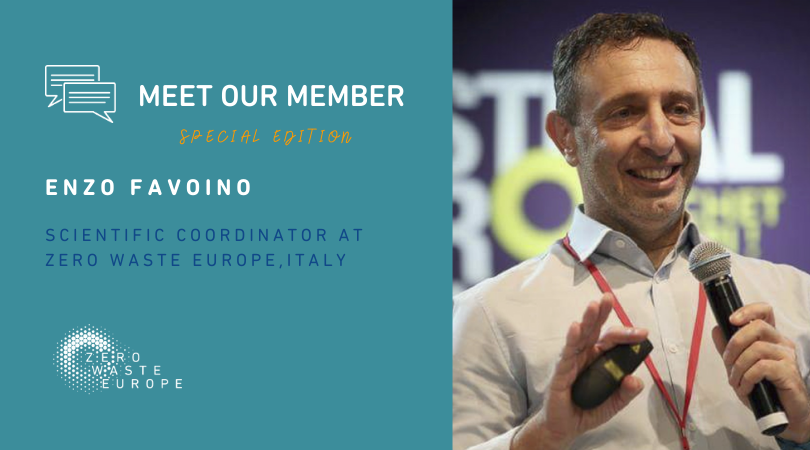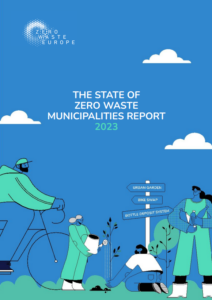Meet our members – Special Edition – Meet our Scientific Coordinator: Enzo Favoino!

Zero Waste Europe is happy to introduce the blog series “Meet our members”. Through this series of monthly interviews, we want to give you a chance to get to know our members and the work they are doing.
This month, for the first special edition of our “Meet our members” series, we are thrilled to introduce you to our Scientific Coordinator.
Meet Enzo Favoino, Scientific Coordinator at Zero Waste Europe
Hi Enzo, can you give us a brief introduction to yourself? How long have you been in the field? And actually, what got you into (zero) waste?
Sure! I have been working at Scuola Agraria del Parco di Monza, a R&D center based in Monza, North Italy since 1990. My role is to promote sustainable management of waste and resources. I am an agronomist by academic education; I started being interested in composting and biowaste strategies, to promote early pilots for separate collection in Italy. Eventually, together with the team at Scuola Agraria, we realised biowaste was a boost for separate collection rates and sustainable management of waste as a whole, hence we progressively started cover all areas of sustainable management of waste, to finally promote zero waste programmes, strategies and practice. The success of the zero waste schemes we implemented in Italy, their operational and economic optimisation, became a reference model for similar strategies in other countries, starting with Spain, Wales and the UK, and then Central Eastern European Countries (which made my professional engagement particularly joyous, albeit hell demanding).
What is your current role at Zero Waste Europe?
I am the Scientific Coordinator of Zero Waste Europe (ZWE) since its foundation. When discussing the need for a pan-European zero waste network, I sat together with Joan Marc Simon, Mariel Vilella, Rossano Ercolini, and others founders of the organisation to brainstorm on its possible structure. We considered right away the need to make our vision rock solid, giving visibility to its technical and scientific strength. The inclusion of technical and scientific arguments in our policy and advocacy work (beside their use in supporting local networks in their day-to-day work) has been one of the main factors of success for the zero waste agenda across the European Union (and beyond, as many non-EU networks are currently relying on our support).
Tell us more about one ongoing campaign/activity you’re working on?
With the European Circular Economy Agenda being inspired by the zero waste vision and becoming more and more solid, there are various aspects of the “zero waste agenda” that keep me happily busy. But, if I could pick one above the others, I would say that the current definition of EU granting programmes, (first and foremost the huge spending capacity of the EU Recovery Funds) is one relevant area of activity. The hundred billion of euros ready to flood to Europe may turn our society into heaven or into hell, depending on whether funds are spent more or less appropriately. So far, the zero waste movement have been particularly successful in driving fundings in the right direction, thanks also to the mindful monitoring of all actions at the EU level by Janek Vahk – Climate, Energy and Air Pollution Programme Coordinator at Zero Waste Europe – and other members of the ZWE staff.
There are other relevant areas the zero waste movement and I, are working on at the European level, such as chemical recycling, the correct implementation of the Single-Use Plastic Directive, and the need to define strategies for residual waste management avoiding incineration.
If there was one thing that you would like your work to be known for, what would it be?
At the moment, I am very busy working on top-down strategies (such as working at the EU level) I do love particularly actions, campaigns and implementation on the ground. Hence, I would mention the Zero Waste Cities Programme, which I consider a pillar of the zero waste methodological approach by Zero Waste Europe and its members. The work with cities shows real operational and economic viability of zero waste schemes! What particularly motivate me are some pilot programmes I am currently promoting (outside the boundaries of my role in Zero Waste Europe, but well connected to it!) on packaging-free purchases which are becoming more and more mainstream in Italy.
How would you describe the growth of the zero waste movement in your country? What is your perspective for the future?
Well, with 300+ Communities that formally committed to a zero waste plan, Italy is one of the strongholds for the zero waste movement. This is mostly the merit of Zero Waste Italy and the leading role of its Founder and Director, Rossano Ercolini. I feel blessed to be involved and help them whenever it’s needed.
Zero waste strategies have been supporting the growth of separate collection, recycling and composting in Italy. However, when discussing anything related to Italy, one should always nuance the opinions (since in each and every sector, there are lights and shadows, best and worst, most and least performing situations). At the moment, there are some key numbers that show how zero has driven Italy to improve its waste management system to a remarkable extent with 61,3% average separate collection in 2019 (ranking 3rd amongst the other EU Member States). But above all, residual waste is getting minimised; according to our metrics, thousands Italian municipalities have now a rate of residual waste below 100kgs kgs/person/year.
Another success story of the zero waste movement in Italy is Milan. The city has above 1M inhabitants and yet it currently has the highest recycling rate thanks to the full extension of kerbside programmes, including food scraps.
To summarise, on a funny note :), I always like to remind people in public discussions or during events, that in the early 90s, the opponents to the zero waste movement were arguing that “Italians are not a good fit for separate collection, and Italy will never reach a separate collection above 20%”. Then, in the early 2000s, they started saying “well, more than 50% of separate collection is not achievable”. Lately, they argue “we achieve the EU target at 65% separate collection, but we won’t go beyond this number”. Today, I like to answer: “well, Sirs, there will be a day in which you’ll say – more than 120% is not possible – and that will be the only time we will agree with each other”. 🙂
Zero waste is a journey, not a destination.
How is the current COVID-19 pandemic impacting your work? And the zero waste movement in your country?
Not that much I would say. Using scientific evidence, we were able to build strong arguments, which influenced also the EU guidelines for separate collection during the COVID-19 crisis (these guidelines confirmed the pivotal role of separate collection and related recycling/composting programmes). We were also able to build a solid narrative on reusables VS single-use. In a nutshell, we emphasised how the virus survived on different surfaces “the higher the reliance on single-use, the higher the turnover of materials coming from outside into our personal sphere, which makes us more vulnerable, not safer”. Governments and health authorities picked on this argument and issued many statements to highlight that reusable solutions were – and are – as safe as their single-use counterparts, if not more.
Also, we were successful in our campaigns against the use of single-use gloves, we had provided arguments against them as a “false sense of safety” and as a way to bring the virus from external areas into shops and supermarkets. Later during the year, the World Health Organisation issued a statement that was fully aligned with our campaign! Hence, Italy repealed its previous obligation to use single-use gloves.
Now, we are currently working to promote reusable face masks, on a “product as a service” model, i.e. renting them, collecting them once used, sanitising them in a centralised way, and making them available for further use. This is also fully endorsed by the health authorities under a strict monitoring programme (read more).
Surely, COVID-19 posed new threats and challenges. But luckily, we were able to tackle these challenges and turn them into new opportunities for new business models, aligned with the zero waste vision.
Zero Wasters, are always happy, and never satisfied. We must be able to rejoice and celebrate for what we have already achieved, since each and every single step forward is a bless. But we must also nurture the ambition to keep improving, since we need to keep walking towards our final destination”


